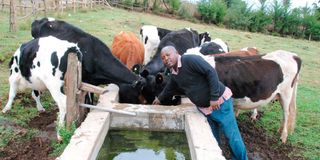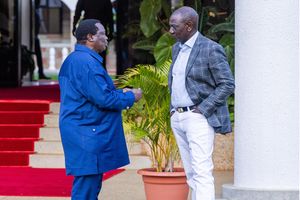Exporting livestock, a fraudsters’ playground

Cornellius Lang'at feeding his cows at Tegat Farm in Elburgon, Molo, Nakuru County.
In my “Miracle Farmers” article, weeks ago, I advised anyone looking for cattle to be aware of fraudsters.
Many readers and farmers responded, identifying with the problem.
At the time of writing the piece, I never knew I had opened a floodgate of fraudulent enquiries and offers.
Experience in the last few months has left no doubt in my mind that a large number of Kenyans believe fraud is business and shamelessly derive a livelihood from it.
Let me first bring into the fold those who may not have read a number of my recent articles on this subject.
I have been looking for Jersey heifers that are three to six months pregnant for export to a neighbouring country.
Jersey is a rare cattle breed in Kenya. The buyer needed 20 heifers and had been informed that he could just fly into Kenya, grab the animals and drive them to his country in weeks.
I deconstructed that notion and advised him that there was the sourcing and international trade compliance process. The two would take at least three months.
We have hit the seventh month since the initial talk. The dry years Kenya experienced in 2021 and 2022 made the availability of the breed more difficult.
Most breeders avoided to inseminate many of their animals due to scarcity and the high cost of feeds.
Initially, I contacted all the farmers I knew bred Jerseys, to no avail. I, therefore, advertised my search to farmer and livestock professional forums. My action was promptly detected by fraudsters. I got some good leads though.
It was like I had just entered a hungry piranha fish frenzy, with everyone trying to get a piece of the cake. I never disclosed in the advertisement that I am a veterinary doctor.
There was a group of fraudsters who sought to consult for me on exporting livestock. Many claimed years of experience and even provided verbal lists of their customers.
However, none was willing to send the lists in writing or even give me a physical office address.
Next was a group that sought to sell me medicines, vaccines and feeds for the export animals.
It was hilarious to hear them explain how the medicines and vaccines work. One even told me there was a disease called FMD that I should be very careful about. When I asked him to give his full name, he confidently said “food and mouth disease”.
The most interesting group comprised those seeking to supply the animals.
There were organised networks of players with very well calculated steps to lure me into their guillotine
Their fraud attempt always started with an innocent and helpful-sounding communication by phone or text.
The first communication would evolve into a long thread culminating in “highly suitable animals” on an undisclosed farm in a county that had the possibility of having dairy cattle.
A majority of the threads ended in Kiambu, Nandi, Nakuru and Uasin Gishu. Some threads were simply absurd.
One thread emanated from Turkana County. The caller said he was an experienced veterinary doctor who had worked in many counties. He claimed to have a nationwide network of cattle spotters developed over his many years of practice.
The man had picked on the wrong choice of career, not knowing he was talking to a veteran in the field. I played along because I wanted to understand the fraudsters’ modus operandi.
The caller said his name was Dan Ngatia and that he graduated from university in 1988. That was bad for him because it was my graduation year too. There was no student by that name.
Ngatia connected me to his associate in Nakuru who initially told me there were cattle in a farm owned by a Kenyan of Indian descent.
He could not give me the farm or owner’s name until I put a down payment for his finder’s fee.
The man shot himself in the foot because he was asking for money rather too fast.
I asked him to send photo of the animals so that I could ask my vet if they were pure Jerseys.
He requested for time to get to the farm and permission to take and share photos. He wanted me to send Sh200 for a motorbike ride. I told him he should include it in the final bill.
Ngatia called in the evening and castigated me for not being serious and wasting his time with unreasonable demands.
He said he was sending me photos of animals and the contact of another one of his associates because the cows spotted earlier had already been sold.
Soon after, a man calling himself Kemboi phoned and said he was the finder of the 15 new animals Ngatia had mentioned.
The animals were reportedly at a farm in Syokimau, Nairobi. He even sent more sample photos.
Kemboi demanded that I pay a commitment fee of Sh100,000 to show I was serious. The amount would bind the owner as I prepared to go and view the heifers.
I looked at the sample photos Kemboi had sent and could not stop laughing.
The cows were in a familiar heavily treed area with a lush background. The heifers also looked familiar. They were the animals we had booked and paid for on a farm in Kiambu County.
I asked Kemboi when the vegetation and climate in Syokimau changed to that of Limuru. He disconnected the phone and I never heard from that fraud team again.





